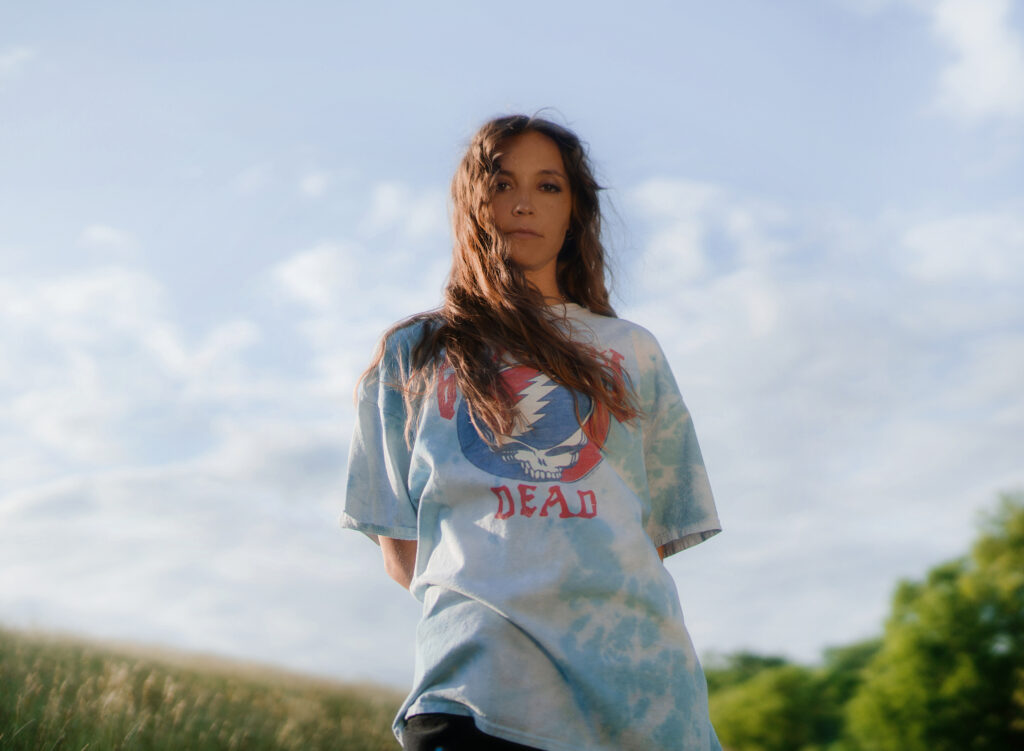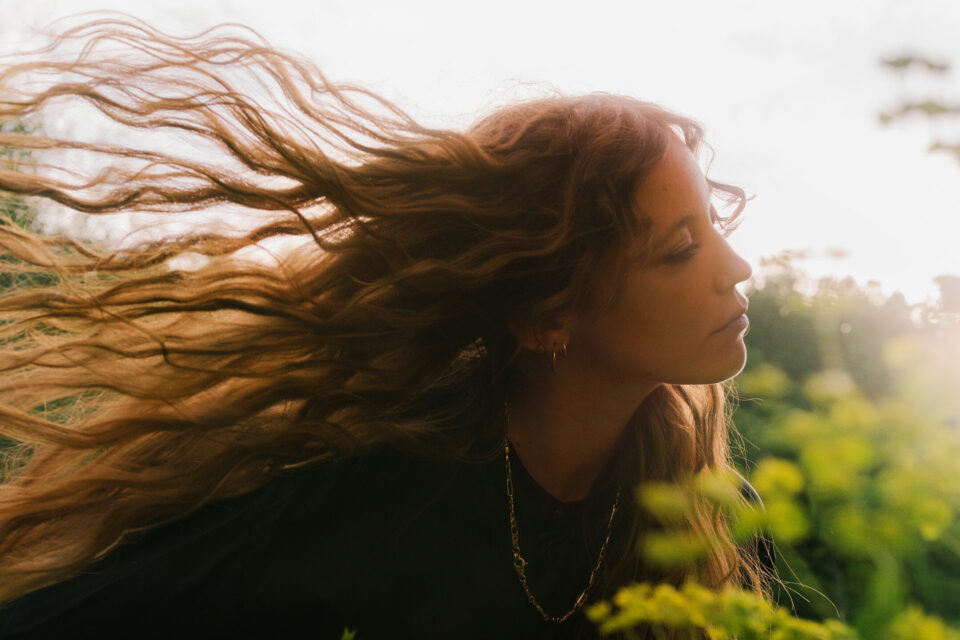WNXP listeners have been bumping to LP Giobbi’s tune “Can’t Let You Go” for several months now – the warm, beachy dance track from her debut record Light Places is one of my most played of the year, to be sure.
But thousands (millions?) more music fans now recognize this artist’s name thanks to the “Swift Effect.” In case you missed it, LP Giobbi was tapped by Swift to reimagine one of her cherished Lover-era pop bangers “Cruel Summer” as part of a three-track EP called The Cruelest Summer. LP Giobbi’s remix (which has already been streamed on Spotify more than 3.9 million times in just 12 days) ups the tempo of the singalong and layers sunny, sustained piano chords and sandy beats under the vocals.
Yet LP Giobbi had a deep and wide following in the electronic dance music scene long before this particular crossover appeal. The Eugene, Oregon native now based in Austin is a UC Berkeley jazz piano performance graduate, trained on the keys from an early age. Her shapeshifting emotional-musical expression utilizes keyboards and turntables, fusing pop, rock, funk, disco and gospel sounds over big beats and build-ups. She’s earned an enthusiastic fanbase through high-energy club gigs and more intimate pandemic lockdown livestreams.
In addition to acclaimed American festivals like Austin City Limits, Coachella and Lollapalooza in recent years, LP Giobbi was booked at Electric Daisy Carnival in Mexico City this spring, where she grinned and grooved before a crowd of nearly 100,000.
What might come as a surprise to many is LP Giobbi’s appreciation for the good ol’ Grateful Dead, the American psychedelic rock band on which she was raised. Fans began to notice her sneakily incorporating tasty Jerry Garcia guitar licks into her club music, and last year, she was invited to play late night beach shows dubbed “Dead House” at Dead and Company’s Playing In The Sand. She was also commissioned by the Garcia family to remix Jerry’s debut solo record for its 50th anniversary, making official the previously recreational mashing of her crunchy and glittery worlds with Garcia (Remixed).

“There are definitely people that hate what I’m doing,” she laughs. And it’s true. Maybe the purists don’t want the ravers messing with their beloved Grateful Dead, and some EDM fans would rather not hear noodly guitar parts atop their guts-shaking drums and bass.
On the other hand, the artist shared a story of a father and son with an admittedly dysfunctional relationship bonding at a hometown show of hers: dad, an elder Gen-X hippie, finding musical common ground with his queer, Gen-Z club kid. “Family is everything to me,” the artist said, and so that was the highest compliment she could receive.
LP Giobbi has also encouraged more inclusivity in electronic music and production through her 501(c)3 Femme House, which offers workshops and scholarships that amplify the talent of women and the BIPOC and LGBTQIA+ communities. She often hears from female and non-binary fans, and participants in Femme House programs, that she’s inspired them to create, to be seen and heard in a male-dominated space.
“You can be the change activism where you don’t talk about the fact that you’re a woman and you normalize it. Or there’s activist activism,” she told me. “And I can’t wait till we get to the point where we don’t have to call it out [the fact that only 2% of producers are women], because that would mean that we’re in a more equal place. Yay, that’s going to be awesome. But we’re not there yet. And so, fuck yeah, I’m a female producer. And, fuck yeah, I want to talk about it.”
She’s an artist and an activist, a curator and a connector. If the joyfully expressive, classically trained pianist, composer, DJ and producer LP Giobbi is indeed a bridge (a nickname her Deadhead mother has given her) between the past and the future of music, between “Shakedown Street” and “Shake It Off,” who dares try to stop her? Not me.
Well before the Taylor Swift reveal, I sat down with LP Giobbi between her Deep Tropics Festival set and headlining gig at Brooklyn Bowl Nashville. We talked about The Dead and her elation in performing the music she loves. We also talked about her work with Femme House and the incorporation of “feeling” and “knowing” music on her debut LP Light Places.
Hear the recently-released deluxe edition and clips from our conversation below.
Being a child of Deadheads and sampling The Dead
“I exist because of the Grateful Dead. [My parents] fell in love following the Grateful Dead around. They were high school sweethearts, but I think that they really, like, solidified and they grew into adults together by following The Dead. They went to hundreds of shows. That’s where all of their memories that have grounded them for a 48-year marriage have come from. [Jerry Garcia’s] voice was like an uncle’s voice in our household growing up. So when his family reached out for me to do the Remix album, I remember sitting in the studio like, ‘Oh, this sounds like a family member’s voice.’…It really ties our family together.”
Transcribing Jerry Garcia using jazz piano training
“I went to school for jazz piano performance, and I think the best way to learn is to study the greats. And so part of my practice was transcribing every day, you know, Thelonious Monk or Oscar Peterson or Miles Davis. I kind of just naturally wanted to do that with Jerry [Garcia], he’s a god to so many people. Like, what is this all about? That really helped me understand. And I was blown away.”
Constructing a “one-woman jam band” and facilitating family connections
“In the pandemic, I got these [Grateful Dead song] stems. I was just in my room by myself playing with them and then I started streaming. And the same people are coming back night after night after night to my streams and so I really wanted to push myself and I started thinking of myself as a one-woman jam band. Like I would take one deck and put just percussion loops and then another deck a different instrument or piano loops and sort of weave them together like maybe a jam band would. I started keying everything so I knew what it was and I could play the piano in that same key.”
Uniting festival-goers through “big, joyous house music”
“[Electric Daisy Carnival] was a really good learning set for me because what I found was, you know, what everybody loves is joy. So I’m just going to play music that…maybe some of them will have big build, some not. But house music is pretty universal…big gospel vocals sort of works universally and I feel good playing it. So that’s where I strike the balance, like when I’m playing to the masses. Big, joyous house music always works.”
Upping a dismal “2%” through her nonprofit org Femme House
“It is my why. It’s the reason I became a producer, I just didn’t see myself represented. And so I wanted to be that representation for somebody else. And it’s still what keeps me going. The community that has formed around Femme House is remarkable and so inspiring. I mean, I’m meeting folks that blow my mind all the time. It is a 501(c)3 nonprofit that teaches women and gender expansive individuals how to produce music.”
Battling burnout
“Our bodies have actual limits. And when you don’t listen to them, you are starving your art and you’re not at your full capacity to be the best human and the best artist that you can be… I was so much a product of this society and really doing over being and, you know, being productive made me feel like a badass. I want to be enough to just be. And I’m not there yet. I’m working on that. I’m working on loving myself enough to just be.”

